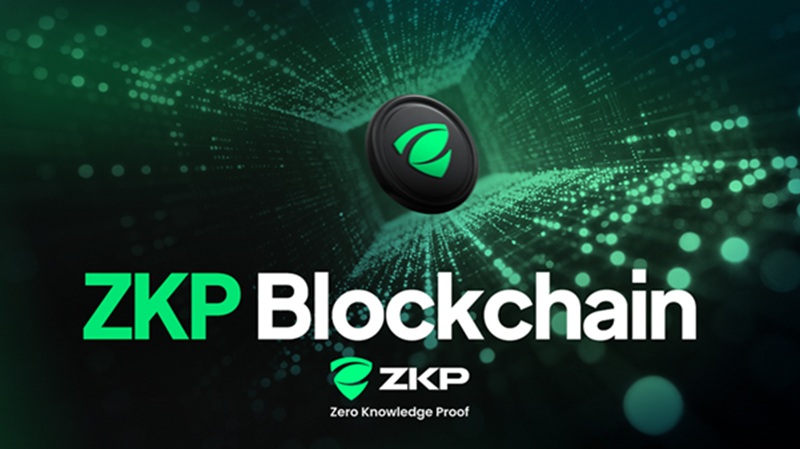The crypto market has slowed, with trading volumes hovering near $6 billion. The Dogecoin current price is holding close to $0.12, while Chainlink crypto is moving sideways around $12. These well known assets appear to be losing momentum, raising doubts about whether such mature tokens can still deliver the kind of explosive gains many investors seek.
This shift in sentiment has brought ZKP into focus. The project is moving quickly through its presale auction phase, and analysts now estimate the total raise could exceed $1.7 billion. Supporters describe this as ownership of the core resource of the AI era. As public data sources become exhausted, experts believe ZKP’s private data marketplace could see sharp demand growth, opening the door to a possible 8,000x return.
Unlike legacy tokens, ZKP is directly linked to the expanding AI data economy. Researchers highlight this clear use case as the reason it is increasingly ranked above older networks, reinforcing its position among the top crypto coins for long term growth.
How ZKP Is Positioning Itself at the Center of AI Data Demand
ZKP is drawing strong attention as its fast paced presale auction continues. Now in Stage 2, the project releases 190 million coins each day through a structured presale auction aimed at fair distribution before mainnet. With more than $100 million already invested into infrastructure, the network is live and functional. This level of self funding signals a serious build out rather than a concept stage idea.

Technology analysts point to this readiness as the reason ZKP is being discussed as one of the top crypto coins to follow closely. They expect the presale auction to move past $1.7 billion, especially since it offers early access to what many view as the essential resource powering future AI systems.
Experts note that AI models are rapidly consuming available public data. As this supply tightens, demand for private and verifiable data sources is expected to rise sharply. ZKP addresses this gap by enabling secure verification without revealing raw information, placing it in a strong strategic position.
Projections of an 8,000x outcome are based on ZKP capturing only a small share of the massive AI data market. Early participants are, in effect, securing access to this emerging economy before a potential $1.7 billion valuation raises the barrier to entry for most buyers.
Researchers stress that timing matters. As availability narrows, they argue that ZKP stands out as a rare opportunity, strengthening its reputation among the top crypto coins for investors focused on generational scale growth.
Dogecoin Price Finds Its Footing After Weekend Pressure
Dogecoin is showing signs of recovery today after facing strong selling pressure over the weekend. The Dogecoin current price is now trading between $0.121 and $0.123, reflecting a rebound of about 1.5% to 2.5% from recent lows. Buyers managed to protect the key $0.117 support area, preventing a deeper slide toward the $0.10 mark.
Traders are now focused on a tight squeeze pattern forming on the charts, a setup that often points to an incoming sharp move. Sentiment feels cautious but optimistic as volume begins to settle.
Analysts are closely monitoring this setup as volatility continues to narrow. Even with Bitcoin trading below $88,000 and broader market caution in place, Dogecoin has held above recent lows. Still, experts note that a clean break above the $0.124 resistance level is needed to confirm a stronger rally. For now, investors are watching closely to see if this bounce can turn into a lasting move.
Chainlink Holds Firm as Big Money Steps In
Chainlink is holding up well today despite weakness across the wider market. The Chainlink crypto price is moving between $11.87 and $12.25, showing only a mild drop of roughly 1.5% to 2.5%. While many large assets are seeing heavier selling, institutional investors appear to be accumulating Chainlink. Data shows that as Ethereum funds recorded $630 million in outflows last week, Chainlink products attracted close to $4 million in inflows. This contrast suggests strong confidence from large investors during uncertain conditions.
Interest is also building around several developments that could support future growth. Bitwise recently described the Chainlink crypto network as undervalued due to its role in linking real-world data to blockchains. The project’s acquisition of Atlas aims to capture more revenue from DeFi activity. At the same time, traders are positioning ahead of regulated futures expected to launch in February. These moves point to solid long-term prospects, helping maintain confidence even as prices consolidate.

Closing View as AI Data Demand Comes Into Focus
The Dogecoin current price is showing a delicate recovery as traders defend important support levels. At the same time, Chainlink crypto is seeing institutional inflows but remains locked in a slow and steady consolidation phase. While these well-known assets offer stability, they may not deliver the fast and dramatic upside that more aggressive investors are seeking right now.
Because of this, analysts are increasingly pointing to the ZKP presale auction as a stronger opportunity. Experts expect the raise to exceed $1.7 billion, giving public investors early access to what many describe as the core resource of the AI era before prices rise sharply.
They also argue that as AI systems run out of public data, demand for ZKP’s private data marketplace could surge. This real-world use case is driving forecasts of an 8,000x outcome, positioning ZKP as a clear leader among top crypto coins for long-term, high-growth potential.
Explore ZKP:
Website: https://zkp.com/
Buy: https://buy.zkp.com
Telegram: https://t.me/ZKPofficial






